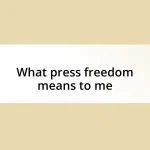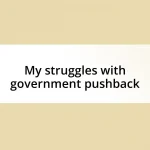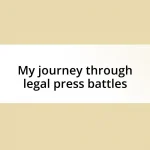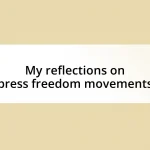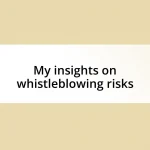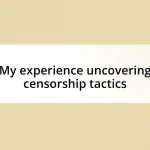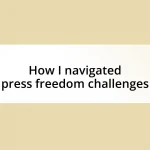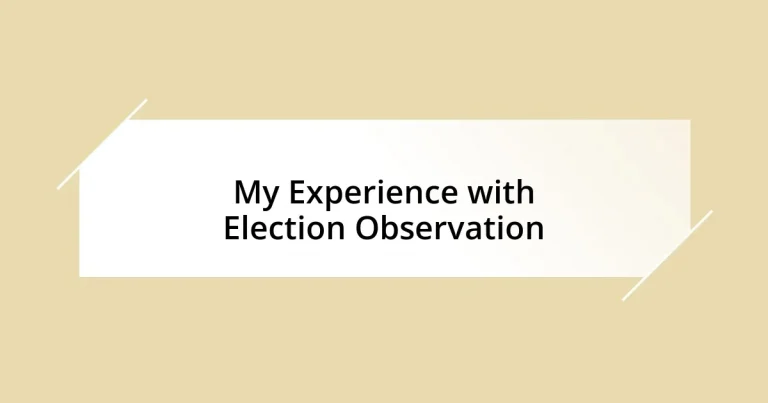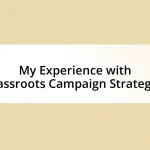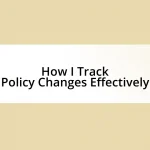Key takeaways:
- Election observation enhances transparency, accountability, and trust in the electoral process, reinforcing the importance of every vote.
- Observers must prepare mentally and logistically, understanding election laws and procedures to ensure effective monitoring.
- Interpersonal dynamics and distractions pose challenges, requiring observers to remain neutral and focused on accurate reporting.
- Interactions with voters can empower and foster confidence, highlighting the observer’s role in the democratic process beyond mere observation.
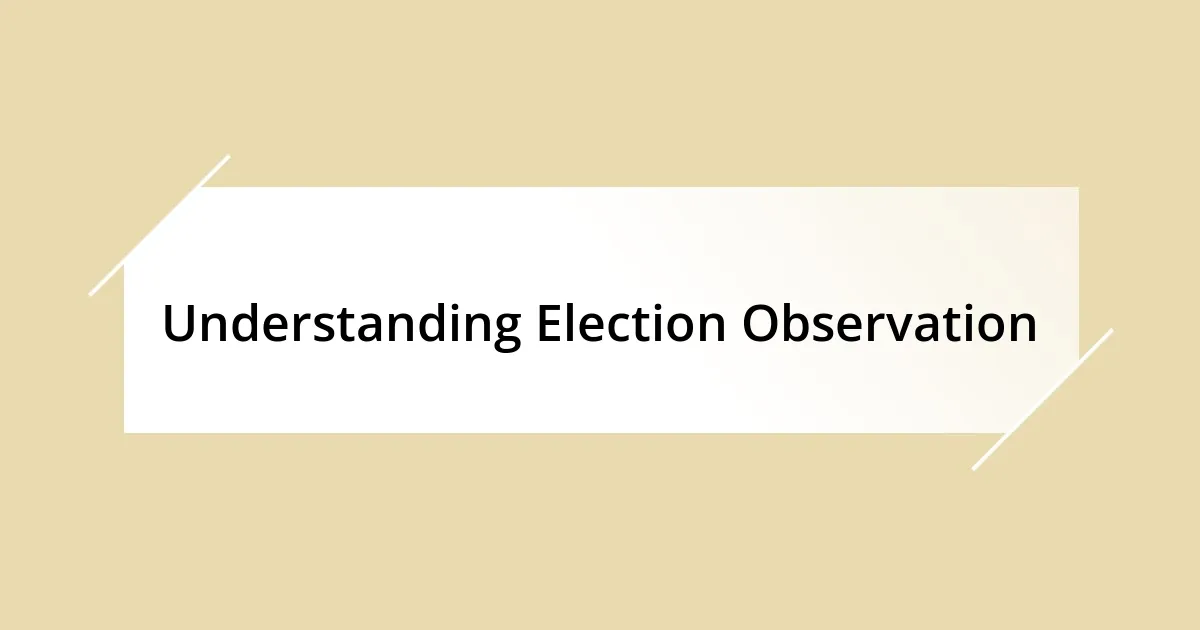
Understanding Election Observation
Election observation plays a crucial role in ensuring transparency and trust in the electoral process. During my first experience as an observer, I felt a mix of excitement and apprehension. I realized then how vital it is for citizens to oversee their elections—after all, isn’t the integrity of our voting system something we should all care about?
As I stood at a polling station, I was struck by the diverse faces of voters lining up, each with their hopes and convictions. It hit me how these moments of democracy are filled with emotion—anticipation, anxiety, and hope. Have you ever felt that rush of adrenaline while witnessing a process so fundamental to our freedom? Being right there made me appreciate the role of observers in validating that each vote counts.
Moreover, observing the procedures didn’t just open my eyes to the mechanics of voting; it also sparked my curiosity. I found myself asking questions about how different systems operate and the varied practices across nations. It was both enlightening and humbling to witness the commitment of those involved, as they worked tirelessly to uphold the values of democracy. How often do we consider the efforts behind the scenes that empower our voices at the ballot box?
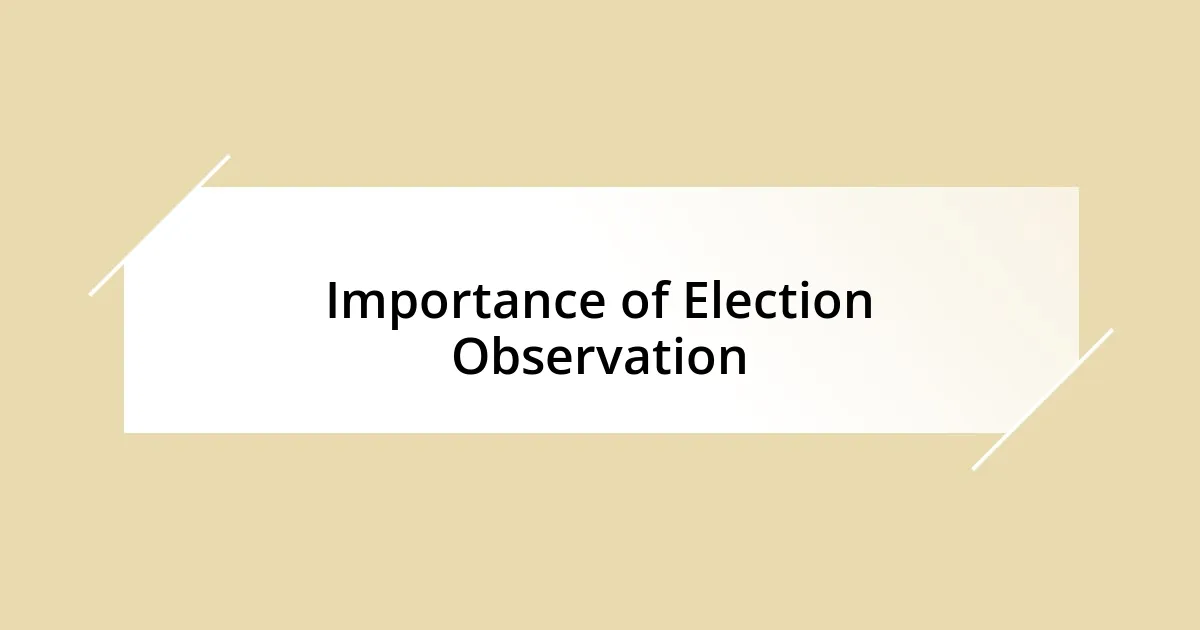
Importance of Election Observation
Election observation is pivotal for observing the fairness of elections; it nurtures a culture of accountability. I still remember the feeling of camaraderie among the observers when we shared our insights on the process. It’s as if a shared mission brought us closer, reinforcing the fact that we were not just bystanders but active participants in safeguarding democracy.
As I witnessed the vote count, the tension in the room was palpable. I often reflect on the diverse strategies used to ensure accuracy—from independent audits to public reporting. These practices demonstrate the importance of transparency, showing that every vote is not merely a statistic but a crucial part of the democratic fabric. Without vigilant observers, wouldn’t we be left to question the integrity of the outcomes?
Furthermore, my experience taught me about the delicate balance between observation and intervention. There’s a fine line; while we are there to monitor, our presence can foster a sense of security among voters and officials alike. It was empowering to realize that just our presence could bring about this trust and verification. How can we not appreciate the profound impact observers have in cementing the democratic process and ensuring every citizen’s voice is truly heard?
| Key Benefits | Personal Insights |
|---|---|
| Ensures Transparency | Witnessing the voting process made me realize how crucial transparency is in fostering public trust. |
| Promotes Accountability | The collective effort of observers was a reminder that accountability is vital in any democratic society. |
| Enhances Trust | Being present during the vote count reinforced my belief in the integrity of elections and the importance of every vote. |
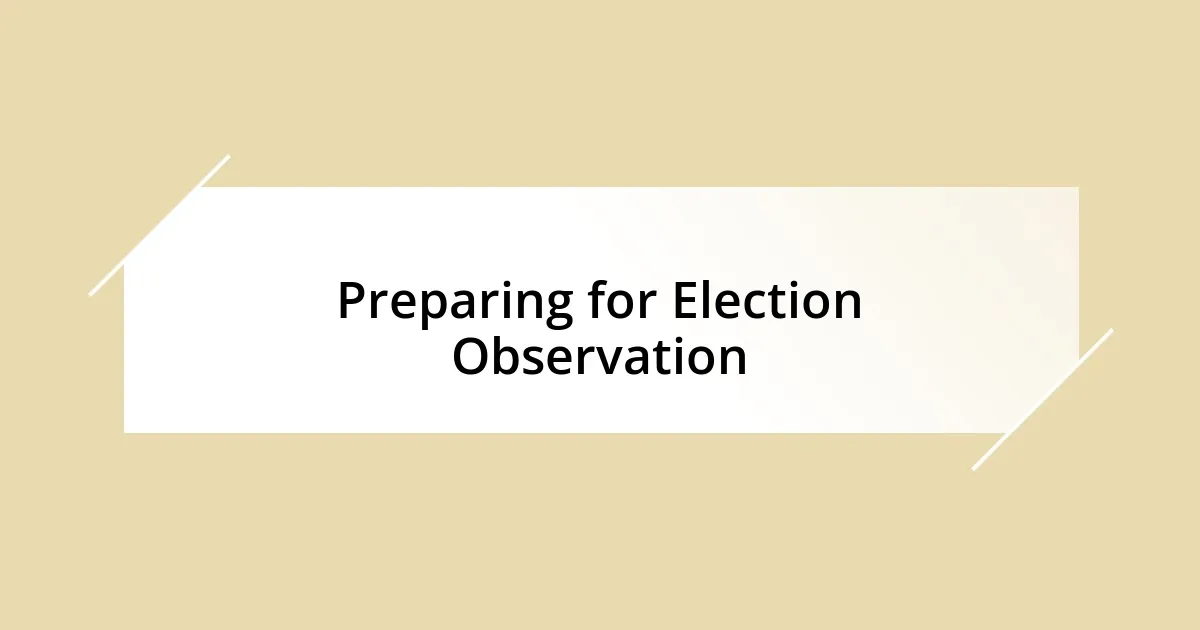
Preparing for Election Observation
Preparing for election observation requires not just logistical planning but also a mental readiness to engage with a complex, charged environment. Before I stepped into my first polling station, I made sure to familiarize myself with the election laws and procedures. It was essential to understand not just what I was observing, but why each step mattered. That sense of preparation gave me confidence as I stood ready to witness democracy in action.
- Pre-Observation Briefings: Attend training sessions or briefings provided by the organizing body to clarify your role.
- Know the Regulations: Review local election laws and procedures thoroughly.
- Gather Observation Tools: Equip yourself with materials like observation checklists and a notebook to record your observations.
- Mental Preparation: Prepare yourself emotionally for the day—it can be a whirlwind of activity, so center yourself to remain attentive.
- Familiarize With the Area: Know the polling locations, accessibility issues, and typical voter demographics so you can anticipate the experience.
I recall feeling a knot of nerves on the morning of the election as I arrived at the polling place. The anticipation in the air was tangible, and I could sense the weight of responsibility resting on my shoulders. Each detail mattered—how voters were greeted, how they cast their ballots, and how the environment felt to those participating. This preparation, both practical and emotional, shaped my experience and helped me to remain focused amid the excitement of the day.
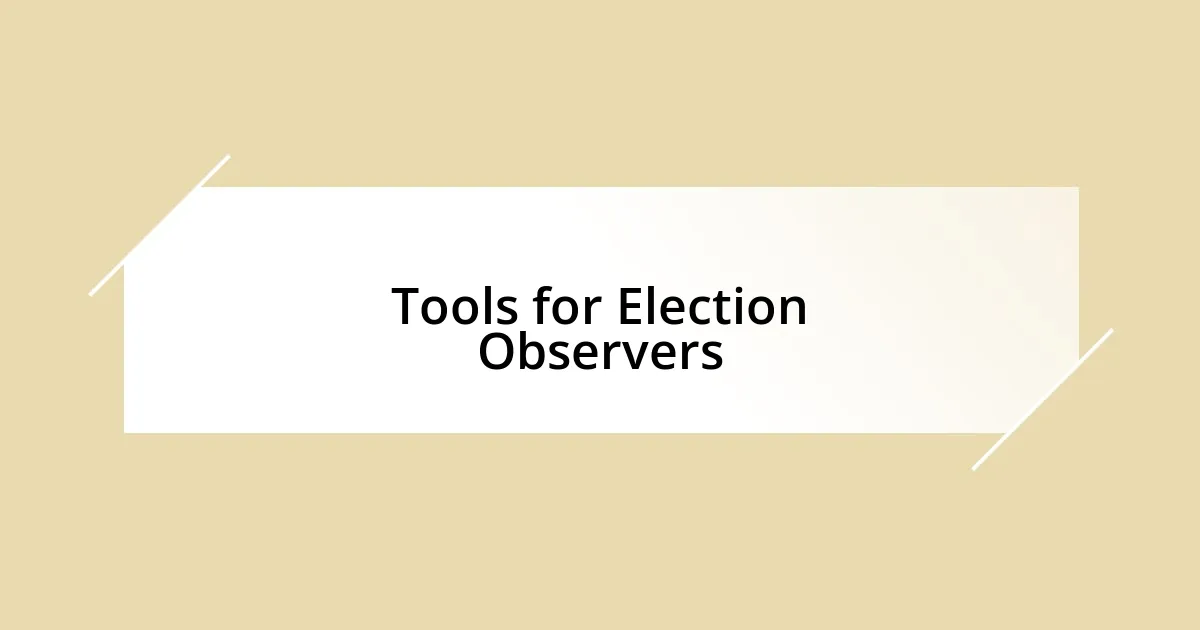
Tools for Election Observers
Engaging as an election observer requires a range of tools that enhance both the accuracy of your findings and the overall experience. A simple yet effective tool I found invaluable during my observations was an observation checklist. This helped me track every aspect of the process, from voter interactions to the security of ballots. Without that checklist, I imagine I would have felt overwhelmed—wouldn’t you? It’s fascinating how structure can ground you amidst the dynamic environment of an election day.
Equally important is the use of a digital device, whether it’s a smartphone or tablet, to record notes and photos discreetly. I remember capturing pivotal moments, like a heartfelt exchange between voters and officials, that encapsulated the spirit of democracy. Just imagine trying to jot down all that excitement manually—it would be a challenge! Having the right technology at your fingertips allows for more fluid observation and immediate documentation of events as they unfold.
Lastly, I can’t stress enough the importance of collaborating with fellow observers. Sharing experiences and insights throughout the day not only enriched my understanding but also created a bond among us. We often exchanged our own observations over coffee during breaks, discussing things like unusual voting patterns or enthusiastic voters. It made me wonder—how often do we find community in a common goal? Building that rapport not only prepared us for our tasks but also emphasized the collective responsibility we all shared in preserving the integrity of the election process.
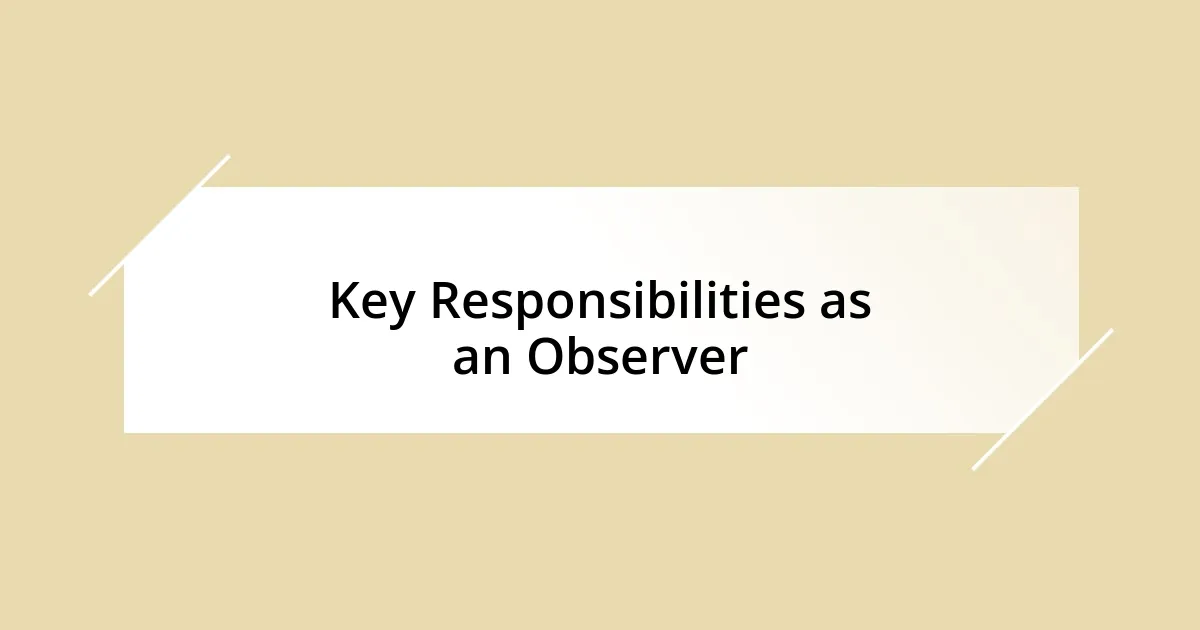
Key Responsibilities as an Observer
As an observer, my primary responsibility lies in accurately reporting on the electoral process, ensuring fairness and transparency. Each time I set foot in a polling station, I felt a profound sense of duty. I asked myself: What can I do today to help protect the integrity of this election? By documenting what I saw with an unbiased eye—everything from voter interactions to the efficiency of the voting process—I aimed to provide a clear picture of the day’s events.
Another key responsibility is to remain neutral and calm in a sometimes volatile atmosphere. I vividly recall a moment when a heated discussion broke out between voters and officials. It could have easily escalated, but I found my role was to observe, listen, and perhaps offer a comforting presence. Staying composed not only helped me gather accurate data but also lent a sense of stability to the situation. In those moments, I often thought, how can my observations contribute to positive change in future elections?
Lastly, I had the duty to report any irregularities or issues that could undermine the electoral process. On one occasion, I noticed several voters struggling with the voting machines. My heart sank—it was a crucial moment of frustration for those individuals. Reporting those findings wasn’t just a box to check off but a commitment to making the process better for everyone involved. With every report I filed, I was reminded that each observation carried the potential to influence future elections and improve accessibility for all voters.
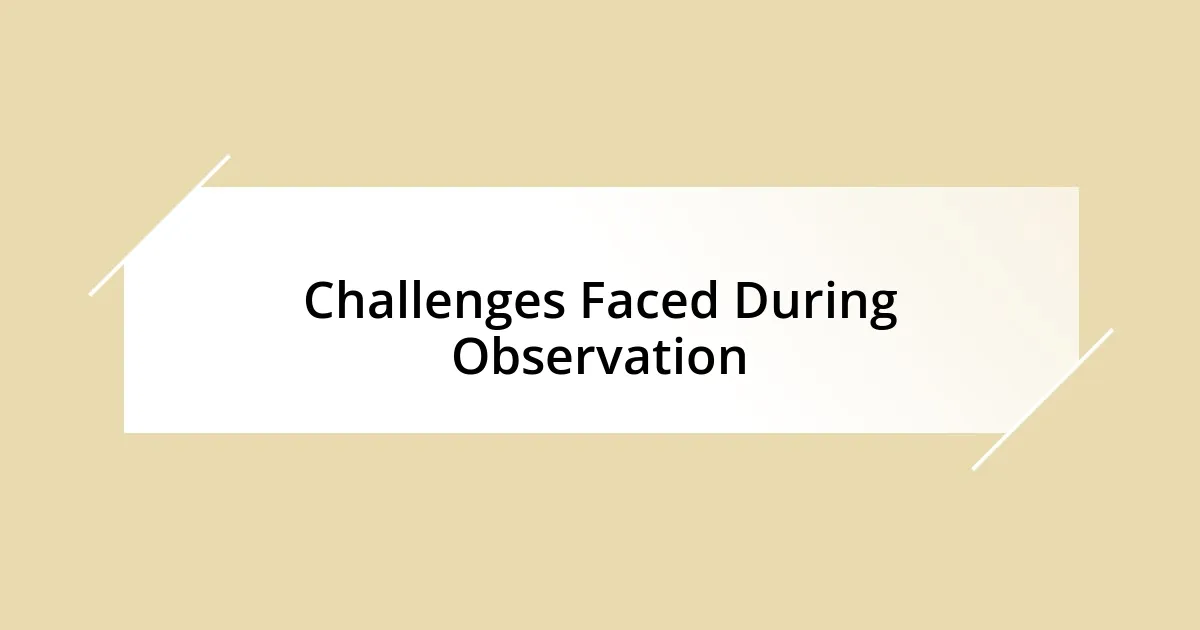
Challenges Faced During Observation
During my time as an election observer, one of the most significant challenges I encountered was navigating the sheer volume of distractions around me. I remember standing in a polling station where the atmosphere buzzed with a mix of excitement and tension. With people chatting, officials discussing logistics, and the constant movement of voters, it was easy to lose focus. Have you ever tried to concentrate in a crowded room? It’s tough! In such moments, I had to remind myself to zero in on what mattered—my observations—while also ensuring the integrity of the environment.
Another daunting challenge was managing interpersonal dynamics, especially in tense situations. I once witnessed a disagreement between a voter and an election worker that escalated quickly. It struck me how vital my role was—I had to remain neutral and approachable, offering reassurance while still gathering data from the sidelines. I often wondered, how do we strike a balance between being an observer and a participant in these moments? It’s a fine line to walk, but it’s essential for maintaining the integrity of the observation process.
Lastly, I faced logistical hurdles, particularly around accessing crucial areas in polling stations. On one occasion, I found myself outside a restricted zone, straining to observe what was happening inside while feeling a little helpless. It brought home the reality of my limitations as an observer. Aren’t we all eager to see the bigger picture? This experience taught me the importance of patience and adaptability. Every challenge was a lesson in resilience, reminding me that behind every observation lies the potential for impactful change.
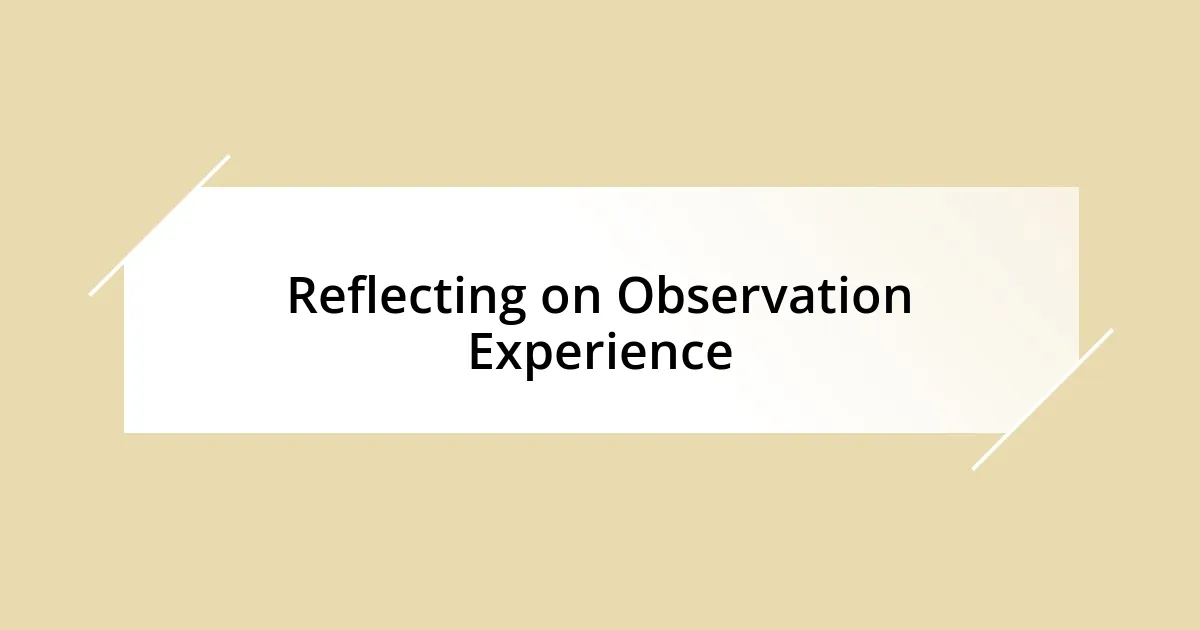
Reflecting on Observation Experience
Reflecting on my observation experience, I found that each moment carried emotional weight. I recall standing in a polling station as voters cast their ballots, their faces a mix of hope and anxiety. It struck me that I wasn’t merely a passive observer; I was part of a pivotal moment in their lives. How incredible is it to witness democracy in action? It filled me with a profound admiration for the process and those participating in it.
One instance that stands out to me involved a young woman who approached me, visibly overwhelmed. She expressed doubts about the voting process and the impact of her vote. In that moment, I felt a surge of empathy and responsibility. I spent a few minutes explaining my role and the importance of her voice in the election. That brief interaction underscored how our observations extend beyond mere facts; they can foster confidence and empowerment among voters. Have you ever realized that a small act can ripple out to create positive change? For me, it was a revelation.
As I look back, I can’t help but appreciate how this experience shaped my understanding of civic engagement. The blend of challenges and triumphs reinforced my belief in the necessity of election observation for ensuring transparent processes. Each day spent observing highlighted the interconnectedness of our roles, the voters and the observers alike. I often wonder, what if everyone approached civic duties with the same dedication? The potential for collective impact is immense, and my experiences have only deepened my commitment to this vital work.
